#Clement on division and peace
Explore tagged Tumblr posts
Text
Exploring Unity and Faithfulness in Clement's First Epistle: Lessons from Early Church Fathers
Clement’s First Epistle to the Corinthians offers a striking look into the early Christian church’s struggles and priorities. Written as a response to division and discord in the Corinthian congregation, it emphasizes unity, obedience, and service—principles that still resonate today. These early teachings encourage believers to live in harmony and remain faithful to Christ’s example. Exploring…
#and obedience#and unity#Apostolic Fathers and church order#Applying Clement’s teachings to modern Christian life#Bible#Biblical parallels in Clement’s First Epistle to the Corinthians#Biblical unity and church leadership#Christian discipleship in Clement’s teachings and the Book of Mormon#Christian family values in Clement’s epistle#Christian virtues and hospitality#Christianity#Church#Church governance in early Christianity#Clement and the Corinthian schism#Clement of Rome and LDS doctrine on family values#Clement of Rome commentary#Clement on division and peace#Clement’s First Epistle to the Corinthians#Clement’s guidance on faith#Clement’s teachings on family roles in early Christianity#Early Christian teachings#Early Christian teachings on grace#Early Christian writings outside the Bible#Faith and works in Clement’s epistle and LDS beliefs#Faith and works in early Christianity#First-century Christian doctrine#First-century Christian unity#God#Historical context of Clement’s writings#Historical insights into Clement’s First Epistle to the Corinthians
0 notes
Text
Events 1.27 (before 1970)
98 – Trajan succeeds his adoptive father Nerva as Roman emperor; under his rule the Roman Empire will reach its maximum extent. 945 – The co-emperors Stephen and Constantine are overthrown and forced to become monks by Constantine VII, who becomes sole emperor of the Byzantine Empire. 1186 – Henry VI, the son and heir of the Holy Roman Emperor Frederick I, marries Constance of Sicily. 1302 – Dante Alighieri is condemned in absentia and exiled from Florence. 1343 – Pope Clement VI issues the papal bull Unigenitus to justify the power of the pope and the use of indulgences. Nearly 200 years later, Martin Luther would protest this. 1606 – Gunpowder Plot: The trial of Guy Fawkes and other conspirators begins, ending with their execution on January 31. 1695 – Mustafa II becomes the Ottoman sultan and Caliph of Islam in Istanbul on the death of Ahmed II. Mustafa rules until his abdication in 1703. 1759 – Spanish forces clash with indigenous Huilliches of southern Chile in the battle of Río Bueno. 1776 – American Revolutionary War: Henry Knox's "noble train of artillery" arrives in Cambridge, Massachusetts. 1785 – The University of Georgia is founded, the first state-chartered public university in the United States. 1820 – A Russian expedition led by Fabian Gottlieb von Bellingshausen and Mikhail Petrovich Lazarev discovers the Antarctic continent, approaching the Antarctic coast. 1825 – The U.S. Congress approves Indian Territory (in what is present-day Oklahoma), clearing the way for forced relocation of the Eastern Indians on the "Trail of Tears". 1868 – Boshin War: The Battle of Toba–Fushimi begins, between forces of the Tokugawa shogunate and pro-Imperial factions; it will end in defeat for the shogunate, and is a pivotal point in the Meiji Restoration. 1869 – Boshin War: Tokugawa rebels establish the Ezo Republic in Hokkaidō. 1874 – Modest Mussorgsky's opera Boris Godunov premieres in Mariinsky Theatre in St.Petersburg. 1880 – Thomas Edison receives a patent for his incandescent lamp. 1916 – World War I: The British government passes the Military Service Act that introduces conscription in the United Kingdom. 1918 – Beginning of the Finnish Civil War. 1924 – Six days after his death Lenin's body is carried into a specially erected mausoleum. 1927 – Ibn Saud takes the title of King of Nejd. 1928 – Bundaberg tragedy: a diphtheria vaccine is contaminated with Staph. aureus bacterium, resulting in the deaths of twelve children in the Australian town of Bundaberg. 1939 – First flight of the Lockheed P-38 Lightning. 1943 – World War II: The Eighth Air Force sorties ninety-one B-17s and B-24s to attack the U-boat construction yards at Wilhelmshaven, Germany. This was the first American bombing attack on Germany. 1944 – World War II: The 900-day Siege of Leningrad is lifted. 1945 – World War II: The Soviet 322nd Rifle Division liberates the remaining inmates of Auschwitz-Birkenau. 1951 – Nuclear testing at the Nevada Test Site begins with Operation Ranger. 1961 – The Soviet submarine S-80 sinks when its snorkel malfunctions, flooding the boat. 1965 – South Vietnamese Prime Minister Trần Văn Hương is removed by the military junta of Nguyễn Khánh. 1967 – Apollo program: Astronauts Gus Grissom, Ed White and Roger Chaffee are killed in a fire during a test of their Apollo 1 spacecraft at the Kennedy Space Center, Florida. 1967 – Cold War: The Soviet Union, the United States, and the United Kingdom sign the Outer Space Treaty in Washington, D.C., banning deployment of nuclear weapons in space, and limiting the usage of the Moon and other celestial bodies to peaceful purposes.
1 note
·
View note
Text
Today's Daily Encounter Wednesday, September 4, 2024
Just One
"For you are all children of God through faith in Christ Jesus. And all who have been united with Christ in baptism have put on Christ, like putting on new clothes. There is no longer Jew or Gentile, slave or free, male or female. For you are all one in Christ Jesus."1
During World War II, Hitler commanded all religious groups to unite so that he could control them. Among the brethren assemblies, half complied, and half refused. Those who went along with the order had a much easier time. Those who did not, faced harsh persecution. In almost every family of those who resisted, someone died in a concentration camp.
When the war was over, feelings of bitterness ran deep between the groups and there was much tension. Finally, they decided that the situation had to be healed. Leaders from each group met at a quiet retreat. For several days, each person spent time in prayer, examining his own heart in the light of Christ's commands. Then they came together.
Francis Schaeffer, who told of the incident, asked a friend who was there, "What did you do then?" "We were just one," he replied. As they confessed their hostility and bitterness to God and yielded to His control, the Holy Spirit created a spirit of unity among them. Love filled their hearts and dissolved their hatred.2
Although the story above is from many years ago, it seemed so relevant for our world today as well. The differing opinions around us have caused division among the brethren. However, it is important to remember something… as children of God, we are ONE body in Christ. Christ is our foundation, and that alone should unite us as we draw closer to Him. It should also be this closeness to God that impacts the way we speak, act, and make decisions. When we realize that everything happening in our world is temporary and shift our focus to the things above, we should feel a sense of urgency to work, united, in reaching others for Christ. We know that the Bible says things will get worse before Jesus returns, so let's invest our energy and effort in doing God's will while there is still time.
When love and unity prevail among believers, especially in times of strong disagreement, it is a vivid testimony to the world of a true follower of Christ.
Suggested prayer: Dear God, I ask that you allow me to be a presence of peace, and that I would seek to build unity and not division. I pray that the unity among your children, even in times of disagreement, would bring others to a personal relationship with Jesus. I know that this world is not my home, and I ask that you help us remain steadfast in You, our Foundation, as we work together to fulfill your will. Thank you for hearing and answering my prayer. In Jesus' name, Amen.Galatians 3:26-28 (NLT). Illustration from Our Daily Bread, October 4, 1992.
NOTE: If you would like to accept God's forgiveness for all your sins and His invitation for a full pardon Click on: http://www.actsweb.org/invitation.php. Or if you would like to re-commit your life to Jesus Christ, please click on http://www.actsweb.org/decision.php to note this.
Daily Encounter is published at no charge by ACTS International, a non-profit organization, and made possible through the donations of interested friends. Donations can be sent at: http://www.actscom.com
ACTS International P.O. Box 73545 San Clemente, California 92673-0119 U.S.A.
Phone: 949-940-9050 http://www.actsweb.org
Copyright (c) 2016 by ACTS International.
When copying or forwarding include the following: "Daily Encounter by Richard (Dick) Innes (c) 2005-2023 ACTS International
Today's Encounter was written by: Crystal B.
0 notes
Text
What was the best mercenary army in history?
The best mercenaries in history are so trusted in their service that the Pope continues to employ them even today.
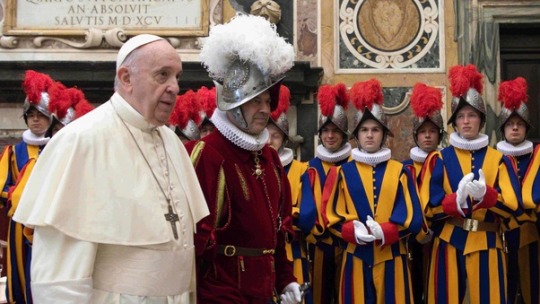
Allow me to introduce The Swiss!
Don’t be fooled by their reputation for neutrality, peaceful scenery, cows, and watches. The Swiss, once known for their powerful infantry, were professional soldiers from the cantons of the old Swiss Confederacy. During the Renaissance, they were renowned for their military prowess, serving as mercenaries in foreign armies, particularly with the French kings. Their exceptional skills made them highly sought after during this period.

Swiss mercenaries in their early days were primarily pikemen, organized into three divisions: Vorbut (Vanguard), Gewalbut (Center), and Nachbut (Rearguard), each varying in size. While they could form three similar columns if their numbers were sufficient, they more commonly arranged themselves in one or two large columns deployed side by side, forming the core of the army they served. Throughout the sixteenth century, the Swiss remained pikemen but later adopted infantry formations and tactics similar to other units in their joined armies. Eventually, they began to take their place alongside other infantry units on the battlefield.

They have a remarkable history in Europe’s most infamous battles and events. They were present during the Parisian mob’s attack on the Tuileries Palace during the French Revolution, the Eighty Years' War, the Protestant Reformation, the Portuguese Restoration War, the Reapers' War, the Nine Years' War, the War of the Quadruple Alliance, the War of the Austrian Succession, the American Revolutionary War, the War of Spanish Succession, the War of 1812, the Peninsular War, and many others. Notably, they protected Pope Clement VII during the infamous Sack of Rome in 1527, where 147 Swiss Guards took up positions on St. Peter’s Square to defend St. Peter’s Basilica and the Vatican against 20,000 attackers, ultimately sacrificing their lives.

They have a reputation for loyalty and chivalry unmatched by other mercenaries throughout history, making modern-day mercenaries pale in comparison READ MORE
0 notes
Text
The difference...
Pictured above are two me who are/were members of the Republican Party.
One of them actually served the nation during the Second World War. He eventually entered politics, serving in the House, the Senate, as Vice President, and ultimately, President of the United States.
What we remember of him is that he and his staff brought in the Plumbers, who were there to stop the information leaks regarding one of the most idiotic moves ever in American political history, the break-in at the Democratic National Committee's offices in the Watergate building, in Washington, DC. (In case you were one of the two people who didn't know this, it's why nearly every political scandal over the past few decades has had the suffix "-gate" attached to it.) The fact is, "Tricky Dick" Nixon tried to use the CIA to intervene in the FBI's investigation of what happened at the Watergate. This, of course, was a violation of Constitutional Law, and it's what led Republican stalwarts, including Barry Goldwater, to go to him with Alexander Haig and urge Nixon to resign, rather than be impeached and removed from office. As they explained to him, there was no way in Hell he'd survive a vote in the Senate, and he'd be the first President ever to be successfully impeached and removed from office.
Nixon, out of a sense of what was best for the Nation, resigned. As in, gone. He left DC like a dog with its tail between its legs, moved back to San Clemente, CA, and spent years in disgrace. And it was a disgrace he brought on himself.
The other individual - I hesitate to refer to him as a "man" - was the spoiled scion of a family that determined that it didn't matter how you won. You simply had to win. And while he attended a military academy, at no point in his life did he step forward to make any sacrifice for the good of the nation. In fact, when it came to the Draft, he managed to get out of it claiming "bone spurs," which former Governor and Senator of Nebraska Bob Kerry called out, making it clear that bone spurs don't magically heal, especially once the Draft Board is off your ass.
After multiple bankruptcies, (including his casinos - explain THAT one to me!), after multiple affairs, after multiple indictments, after multiple judgments against him, after denigrating our nation's allies, after trashing NATO, Donald John Trump insists he's the best choice for the Oval Office. His claims of sacrifice do not withstand close scrutiny, and in spite of his enablers such as Rush Limbaugh, Sean Hannity, and Tucker Carlson, he is anything BUT a patriot, fomenting a rebellion at the United States Capitol, one which his idiot loinfruit watched and laughed about from the other side of town. Rather than allowing the peaceful transfer of power as had happened for nearly 250 years, he sought to overthrow our nation's government, and threatened to KILL those who opposed him.
Seriously, the first man, Richard Milhous Nixon, was far more patriotic, and rather than put the nation through a divisive trial in the Senate, he left office. He might not have accepted his exile graciously, but he accepted it, nevertheless.
Trump doesn't give a damn about niceties like Constitutional Law, Civil Order, Rule of Law, our Democratically established institutions. He's already told us, if he can, he'll overthrow the government, 86 the Constitution, and create a dictatorship in the mold of Putin's Russia.
So, here's our choice, folks. We can keep what we know works and ditch that bitch, or we can just discard the great experiment of self-government laid down when James Madison and his allies penned the Constitution.
You don't trust Biden? New flash: you're not supposed to.
In fact, you're not supposed to blindly trust any of them. You're supposed to be informed, you're supposed to understand the Constitution, and compare that to their actions. You're supposed to be asking the hard questions that a citizen MUST ask, and if you aren't, my question is how can you call yourself a citizen?
I don't like Joe Biden. I don't trust him. But here's the thing: Joe Biden gives direct answers to direct questions. Unlike many members of Congress, he recognizes that we the people have the right to petition our government and demand that they address our greivances. (This is unlike the late, unlamented (by those of us who respect the Constitution) Dianne Feinstein who did all she could to avoid hearing what we the people had to say, and the same goes for Nancy Pelosi, who according to many, used her position so she could engage in insider trading.) In other words, Joe Biden doesn't expect blind trust. He knew it going in.
Trump? As yourself what sort of a man demands allegiance to HIM, rather that the Constitution. As James Comey about that one.
I just got my ballot for the Primary. I have to make a decision. I'm still gathering information.
But one thing's for damn sure: I'm standing with the Constitution. That means in the end, it's Biden.
It also means it won't be Trump. I don't suffer from Donnorheah.
0 notes
Text
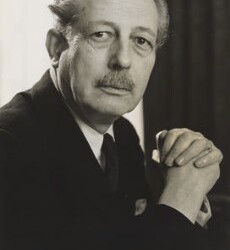
Former Conservative Prime Minister, Harold Macmillan (First Earl of Stockton), died on December 29th, 1986.
Prime Minister Margaret Thatcher, rising above their ideological differences, noted that 'his death left a void in politics which could not be filled', while former Prime Minister Edward Heath described him as possessing 'one of the most creative minds in British politics'.
Macmillan’s generally progressive views, economically and socially, found him at odds with the right wing of the Tory Party (Clement Attlee described him as the ‘most radical man I’ve known in politics’), but he found success as Housing Minster in the 1950s Churchill government and boosted Nye Bevan’s faltering housing programme. He ‘emerged’ as Tory leader and Prime Minister following the resignation of Anthony Eden over Suez, and led the party to a third consecutive election win in 1959, on the back of strong personal popularity and a magical combination of economic figures which encompassed almost full employment, substantial wage growth and low inflation.
He spoke in the parliament of Apartheid South Africa on decolonisation and racial equality, was pro-Europe, tried to encourage US President Eisenhower toward dialogue with the Soviets to de-escalate the Cold War, and spoke of the Commonwealth’s role in mitigating global poverty and improving living standards, and to harness Britain’s economic power in the cause of peace.
But by the early 1960s the previously strong economy was sliding into stagflation territory, and Macmillan’s personal popularity was in decline as the government suffered some by-election reversals. His judgement was called into question over his purge of one third of the Cabinet ('the night of the long knives') and his inept handling of the Profumo affair. He ceded leadership to Alec Douglas-Home in late 1963.
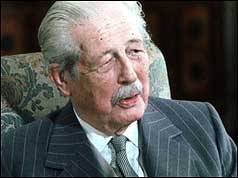
He finally accepted a hereditary peerage in 1984, and used his maiden speech (aged 90) in the House of Lords to make some pointed observations about the Miners’ Strike.
''...It breaks my heart to see - and I cannot interfere - what is happening in our country today. This terrible strike, by the best men in the world, who beat the Kaiser's and Hitler's armies and never gave in. It is pointless and we cannot afford that kind of thing...Then there is the growing division of comparative prosperity in the South and an ailing North and Midlands. We used to have battles and rows, but they were quarrels. Now there is a new kind of wicked hatred that has been brought in by different kinds of people...''
Harold Macmillan, at one point known as ‘Supermac’, was a calm and respected international statesman in perilous times, described as having 'the confidence and wit of a master political operator hidden beneath the image of an old buffer’.
(images: National Portrait Gallery and BBC On This Day)
#harold macmillan#cold war#british politics#british prime ministers#social history#history#british empire#social justice#economics#twentieth century britain#society#uk politics
28 notes
·
View notes
Text
a few of my favorite anarchist quotes:
“I believe neither in constitutions, nor in laws. Even the best of constitutions would not satisfy me. it is something else that we need: effervescence and life, a new world without laws and therefore free.”
-Mikhail Bakunin
“Whoever speaks of the State, speaks of fortresses—speaks of the violent separation of one portion of humanity from all the other portions, equally imprisoned in other State, they speak of the rivalry, competition and perpetual war of the States; they speak of conquest, dispossession and patriotic and glorious massacre, both within and without: legalized and regulate oppression and exploitation of the labor of the people, for the profit of a dominant minority ”
-Mikhail Bakunin
“If this is the price to be paid for an idea, then let us pay. There is no need of being troubled about it, afraid, or ashamed. This is the time to boldly say, “Yes, I believe in the displacement of this system of injustice by a just one; I believe in the end of starvation, exposure, and the crimes caused by them; I believe in the human soul regnant over all laws which man has made or will make; I believe there is no peace now, and there will never be peace, so long as one rules over another; I believe in the total disintegration and dissolution of the principle and practice of authority; I am an Anarchist, and if for this you condemn me, I stand ready to receive your condemnation.”
-Voltairine de Cleyre, Exquisite Rebel: The Essays of Voltairine de Cleyre
“But—and here is the reason why we are anarchists—we want minorities to defer voluntarily whenever necessity and the feeling of solidarity require it. We want the division of labour not to divide men into classes, turning some into directors and chiefs, exempt from any sort of off-putting work, and condemning others to serve as society’s beasts of burden. We want men, when they delegate a role to others—which is to say, allocate a given task to others—not to be abdicating their own sovereignty and, wherever a representative may be called for, that he may serve as the spokesman for those from whom he receives his mandate or the executor of their wishes, rather than someone who makes laws and enforces acceptance of them. And we believe that any social arrangement that is not founded upon the free and considerate will of its members, leads to oppression and exploitation of the masses by a tiny minority.”
-From a matter of tactics to a matter of principle by Errico Malatesta
“As I said before, every case in which is raised the question of right or wrong has about it peculiar circumstances which must decide. So long as nature knows no absolute right or wrong, man will know none, and nature will always act, as she acts now and ever has acted, upon the impulse of the moment.
Forces which have been at work through all time determine such acts, but nothing determines that these forces shall cause such acts. That they do is enough. Why should they not? Why should we suppose a controlling hand? Every man, when he is about to act, must decide for that time whether such act will be just. There is no absolute justice by which he can measure his act.
Still, there is justice in the world, but it is simply an ever-varying phase of human nature. The moment you define justice, that moment it ceases to be justice. This—the defining of justice—was the greatest fault of the State; this was the greatest barrier to liberty; this was the greatest barrier to human happiness; this was the greatest curse of the human race”
-Clement M. Hammond, “Then and Now” (1884)
“For we each of us deserve everything, every luxury that was ever piled in the tombs of the dead kings, and we each of us deserve nothing, not a mouthful of bread in hunger. Have we not eaten while another starved? Will you punish us for that? Will you reward us for the virtue of starving while others ate? No man earns punishment, no man earns reward. Free your mind of the idea of deserving, the idea of earning, and you will begin to be able to think.”
-The Dispossessed by Ursula K. Le Guin
“Both hope in a collapse and despair in the face of the present catastrophic reality involve looking at the present world on its terms, not on our own. Those who hold to either perspective have already assumed their own incapacity to act effectively in the world to realize their own desires and dreams. They, therefore, look at the realities of the world not as challenges to be faced and overcome, but as inevitabilities that must be endured. What is missing is the reversal of perspective referred to by Vaneigem, the individual insurrection that is the first step toward social insurrection. To take this step, it is necessary to have the courage to wager on ourselves and our ability to act, on our own when necessary, and together with others whenever possible.
[….]
The world as it is today can seem overwhelming. The idea that revolution is ‘unrealistic’ is not an illogical conclusion, but regardless of the fierceness of the rhetoric of those who assume this, it indicates a surrender to the present reality. No matter how we choose to encounter the world, we are taking a gamble. There are no certainties, and for me this is part of the joy of life. It means that I can make choices on how I will act and that I can base those choices on my own desires. I desire a world in which the relationships between people are determined by those involved in terms of their needs, desires and aspirations. I desire a world in which every system of domination, every form of exploitation, all forms of rule and submission have ceased to exist. If I lay my wager against revolution, I am bound to lose. If instead I stake my life on immediately rebelling against the ruling order with the aim of social insurrection and revolutionary transformation, there is a possibility that I may win in the long run, and in the short run I will definitely win, because I will have made so much of my life my own against the ruling order that I will have actually lived, vibrantly in rage and joy.”
-Wolfi Landstreicher, “The Revolutionary Wager”
10 notes
·
View notes
Photo

WE can only hope this happens again
August 8, 1974In an evening televised address on August 8, 1974, President Richard M. Nixon announces his intention to become the first president in American history to resign. With impeachment proceedings underway against him for his involvement in the Watergate affair, Nixon was finally bowing to pressure from the public and Congress to leave the White House.
“By taking this action,” he said in a solemn address from the Oval Office, “I hope that I will have hastened the start of the process of healing which is so desperately needed in America.��Just before noon the next day, Nixon officially ended his term as the 37th president of the United States. Before departing with his family in a helicopter from the White House lawn, he smiled farewell and enigmatically raised his arms in a victory or peace salute. The helicopter door was then closed, and the Nixon family began their journey home to San Clemente, California. Minutes later, Vice President Gerald R. Ford was sworn in as the 38th president of the United States in the East Room of the White House.
After taking the oath of office, President Ford spoke to the nation in a television address, declaring, “My fellow Americans, our long national nightmare is over.” He later pardoned Nixon for any crimes he may have committed while in office, explaining that he wanted to end the national divisions created by the Watergate scandal.
On June 17, 1972, five men, including a salaried security coordinator for President Nixon’s reelection committee, were arrested for breaking into and illegally wiretapping the Democratic National Committee headquarters in the Washington, D.C., Watergate complex. Soon after, two other former White House aides were implicated in the break-in, but the Nixon administration denied any involvement. Later that year, reporters Carl Bernstein and Bob Woodward of The Washington Post discovered a higher-echelon conspiracy surrounding the incident, and a political scandal of unprecedented magnitude erupted.
In May 1973, the Senate Select Committee on Presidential Campaign Activities, headed by Senator Sam Ervin of North Carolina, began televised proceedings on the rapidly escalating Watergate affair. One week later, Harvard law professor Archibald Cox was sworn in as special Watergate prosecutor. During the Senate hearings, former White House legal counsel John Dean testified that the Watergate break-in had been approved by former Attorney General John Mitchell with the knowledge of White House advisers John Ehrlichman and H.R. Haldeman, and that President Nixon had been aware of the cover-up.
Meanwhile, Watergate prosecutor Cox and his staff began to uncover widespread evidence of political espionage by the Nixon reelection committee, illegal wiretapping of thousands of citizens by the administration, and contributions to the Republican Party in return for political favors.
In July, the existence of what were to be called the Watergate tapes–official recordings of White House conversations between Nixon and his staff–was revealed during the Senate hearings. Cox subpoenaed these tapes, and after three months of delay President Nixon agreed to send summaries of the recordings. Cox rejected the summaries, and Nixon fired him. His successor as special prosecutor, Leon Jaworski, leveled indictments against several high-ranking administration officials, including Mitchell and Dean, who were duly convicted.
Public confidence in the president rapidly waned, and by the end of July 1974 the House Judiciary Committee had adopted three articles of impeachment against President Nixon: obstruction of justice, abuse of presidential powers, and hindrance of the impeachment process. On July 30, under coercion from the Supreme Court, Nixon finally released the Watergate tapes. On August 5, transcripts of the recordings were released, including a segment in which the president was heard instructing Haldeman to order the FBI to halt the Watergate investigation. Three days later, Nixon announced his resignation.
10 notes
·
View notes
Photo

1 Therefore, my brethren, whom I love and long for, my joy and crown, stand firm thus in the Lord, my beloved.
Exhortations
2 I entreat Eu-o′dia and I entreat Syn′tyche to agree in the Lord. 3 And I ask you also, true yokefellow, help these women, for they have labored side by side with me in the gospel together with Clement and the rest of my fellow workers, whose names are in the book of life.
4 Rejoice in the Lord always; again I will say, Rejoice. 5 Let all men know your forbearance. The Lord is at hand. 6 Have no anxiety about anything, but in everything by prayer and supplication with thanksgiving let your requests be made known to God. 7 And the peace of God, which passes all understanding, will keep your hearts and your minds in Christ Jesus.
8 Finally, brethren, whatever is true, whatever is honorable, whatever is just, whatever is pure, whatever is lovely, whatever is gracious, if there is any excellence, if there is anything worthy of praise, think about these things. 9 What you have learned and received and heard and seen in me, do; and the God of peace will be with you. — Philippians 4:1-9 | Revised Standard Version (RSV) Revised Standard Version of the Bible, copyright © 1946, 1952, and 1971 the Division of Christian Education of the National Council of the Churches of Christ in the United States of America. All rights reserved.
#keep#hearts#minds#focused#Jesus Christ#peace of God#thanksgiving#prayer#joy#worthy#meditation#The Epistle to the Philippians#Philippians 4:1-9#New Testament#Revised Standard Version of the Bible#RSV#the National Council of the Churches of Christ in the United States of America
18 notes
·
View notes
Text
The back end of the order
Prepare a tentative marketing plan. It is important that you know that marketing does not necessarily have to cost you a lot of money. Some business can survive and prosper by word of mouth. Over 50 years ago, the United States jumped into Korea without provocation of any kind. Few spoke up before 33,000 Americans died and untold numbers of Koreans and Chinese. During Vietnam, peace demonstrators chanted, "Give peace a chance." Over 53,000 young American boys and 2.1 million Vietnamese died with hundreds of thousands wounded.
wholesale jerseys from china Soon it's time to hand out the sacred jerseys. The last geeing up is done. There's a bit of shouting. Stephen Curry isconsidered by manyto be the greatest shooter in National Basketball Association history. How does he average more than 30 points per game? cheap nfl jerseys There's no doubt that he possesses an extraordinary amount of natural talent. But what really sets him apart is his drive to push his training to a place where few athletes have gone.. wholesale jerseys from china
cheap jerseys Not least, voicemails are something of an historical record. I had a colleague who, at the end of a year, made a tape of all the voice messages he'd received and catalogued them, in the way people keep old diaries. I really wish I'd done the same. Pakistan Waziristan adventure might blow up on their faces. They have hesitated to go near the Taliban all these years. Now they are forced to whack the beehive. cheap jerseys
cheap jerseys Was awesome, said junior forward Samantha Wheeler. A great experience to have under our belts before most America East teams have even thought about starting their season. Coach Cindy Blodgett team posted a 3 1 record, https://www.wholesalejerseyslan.com/ getting a head start on its season with a foreign tour permitted once every four years by NCAA rules.. cheap jerseys
wholesale jerseys A court and game that really revolutionized event and team courts of the mid 90's and beyond was the 1995 NBA All Star Game in Phoenix. That court design broke many of the "unwritten rules" for how NBA courts (and college courts for that matter) would be designed. After the success of the event branded look in Phoenix, teams began to call upon the NBA Creative Services division to provide court designs when they would change their identity or when purchasing a new court.. wholesale jerseys
Cheap Jerseys from china Aaron Woods will make his Test debut after scoring two tries againstPNGon Sunday. A dearth of front row options will see Sam Thaiday shift up front to partner Woods. Other Test debutants set to be picked include Hunt, nfl jerseys David Klemmerand Aidan Guerra, while Dylan Napa, Josh McGuire and Josh Jackson could squeeze into a bench spot.. Cheap Jerseys from china
nfl jerseys For the record, Captain Canada has never been Michael Saunders nickname, despite the all star push. And what are the odds of this: Both Saunders and Jay Bruce in the same all star game. Hate to be a things were better in my day kind of guy, but I still remember being in awe of all stars as a kid: The 1971 National League team outfield had Hank Aaron, Willie Mays, Roberto Clemente, Pete Rose, Willie Stargell, Rusty Staub, Lou Brock. nfl jerseys
cheap jerseys Of course they couldn't bet with you until they were fully paid up. A friend of mine who also made book allowed his customer whose biggest bets were typically $200 or $300 bet the max of 2k or 4k when he was buried 11k or 12k in a week. http://www.okcheapjerseys.com/ Crazy is if this guy loses he never pays the book he never has that money, I know because he still owes me to this day. cheap jerseys
"A lot of guys had good days. The heart of the order. The back end of the order. "I never want to be satisfied with where I am when it comes to basketball," said McConnell, who has played in 131 of a possible 133 games with the Sixers. "I think, for me, there are always so many areas where I can get better, and that's what drives me every day. I know some people may not think I belong in this league and, at first, I just wanted to stick.
Cheap Jerseys china The pair met through a mutual friend, the South African rider Daryl Impey in 2009. At the time the woman born in Neath but raised in South Africa was working as an IT technician, with a sideline in cycling photography. wholesale jerseys from china Their relationship blossomed and by 2011 they were living together in Monaco a place Wiggins once, perhaps not entirely coincidentally, described as a Froome proposed to her earlier this year.. Cheap Jerseys china
wholesale jerseys If you do not file your return and pay your tax by the due date, you may have to pay a penalty. You may also have to pay a penalty if you substantially understate your tax, understate a reportable transaction, file an erroneous claim for refund or credit, or file a frivolous tax submission. If you provide fraudulent information on your return, you may have to pay a civil fraud penalty.. wholesale jerseys
The area was hard hit for nearly a year while people avoided coming to the area because of the removal of the Crescent Lot, which accommodated about 170 cars at capacity. https://www.cheapjerseys18.com/ The lot is staffed 24 hours a day, is brightly lit and will hold over 400 vehicles. Now, with the best parking facility in the area, the Downtown Business District is looking forward to a booming holiday season.
Cheap Jerseys free shipping Take an experienced look in the components present the good hair care goods in which you at present use. Eliminate any product, or at the minimum restriction using of any product, that contains alcoholic shots. These types of things usually freed from moisture ones hair out which help it become nike air jordan appear and feel bad Cheap Jerseys free shipping.
1 note
·
View note
Text
6th King of Portugal and of the Burgundy Dynasty: King Dinis of Portugal, “The Farmer/ The Poet”

Reign: 6 February 1279 – 7 January 1325 Predecessor: Afonso III
Dinis (9 October 1261 in Lisbon – 7 January 1325 in Santarém), called the Farmer King (Rei Lavrador) and the Poet King (Rei Poeta), was King of Portugal. The eldest son of Afonso III of Portugal by his second wife, Beatrice of Castile, and grandson of king Alfonso X of Castile (known as the Wise), Dinis succeeded his father in 1279. His marriage to Isabel of Aragon, who was later canonized as a saint of the Roman Catholic Church, was arranged in 1281 when she was 10 years old.

Dinis ruled Portugal for over 46 years. He worked to reorganize his country's economy and gave an impetus to Portuguese agriculture. He expanded the planting of a large pine forest (that was almost burned out in the forests fires in 2017) near Leiria to prevent the soil degradation that threatened the region and as a source of raw materials for the construction of the royal ships. He was also known for his poetry, which constitutes an important contribution to the development of Portuguese as a literary language.

In 1290, Dinis began to pursue the systematic centralization of royal power by imposing judicial reforms, decreeing Portuguese "the official language of legal and judicial proceedings", creating the first university in Portugal, and ridding the military orders in the country of foreign influences. His policies encouraged economic development with the creation of numerous towns and trade fairs. He advanced the interests of the Portuguese merchants, and set up by mutual agreement a fund called the Bolsa de Comércio, the first documented form of marine insurance in Europe, approved on 10 May 1293. Always concerned with development of the country's infrastructure, he encouraged the discovery and exploitation of sulphur, silver, tin and iron mines and organised the export of excess production of agricultural crops, salt, and salted fish to England, Flanders, and France.
Dinis signed the first Portuguese commercial agreement with England in 1308, and secured a contract in 1317 for the services of the Genoese merchant sailor Manuel Pessanha as hereditary admiral of his fleet, with the understanding that Pessanha and his successors should provide twenty Genoese captains to command the king's galleys, thus effectively founding the Portuguese navy.
In 1289 Dinis had signed an agreement with Pope Nicholas IV, swearing to protect the Church's interests in Portugal. When Pope Clement V allowed the annihilation of the Knights Templar throughout most of Europe on charges of heresy, Dinis was the only King who protected the Templars and a way to do so Dinis created in 1319 a Portuguese military order, the Order of Christ, for those knights who survived the purge. The new order was designed to be a continuation of the Order of the Temple. Dinis negotiated with Clement's successor, John XXII, for recognition of the new order and its right to inherit the Templar assets and property.
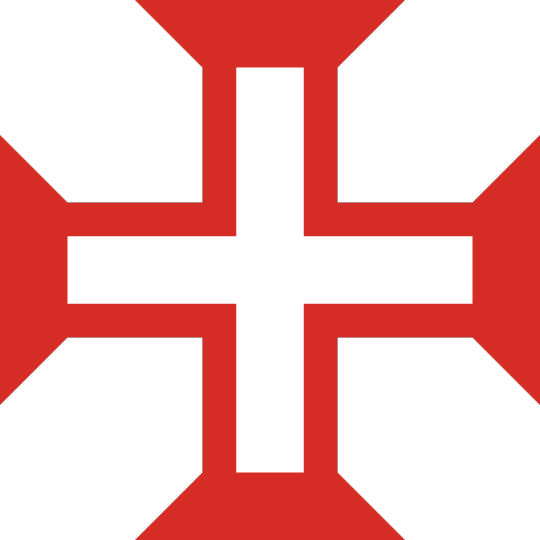
During Dinis' reign, Lisbon became one of Europe's centres of culture and learning. The first university in Portugal, then called the Estudo Geral (General Study), was founded with his signing of the document Scientiae thesaurus mirabilis in Leiria on 3 March 1290. Lectures in the arts, civil law, canon law, and medicine were given, and on 15 February 1309, the king granted the university a charter, the Magna Charta Privilegiorum. The university was moved between Lisbon and Coimbra several times, and finally installed permanently in Coimbra in 1537 by order of King João III.
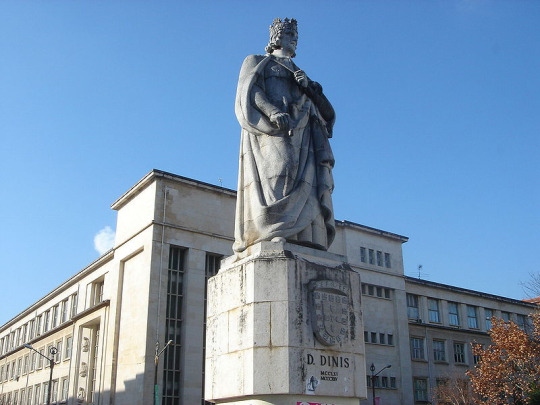

As a devotee of the arts and sciences, Dinis studied literature and wrote several books on topics ranging from government administration to hunting, science and poetry, as well as ordering the translation of many literary works into Galician-Portuguese (Portuguese had not yet fully evolved into a distinct language), among them the works attributed to his grandfather Afonso X. He patronize troubadours, and wrote lyric poetry in the troubadour tradition himself. His best-known work is the Cantigas de Amigo, a collection of love songs as well as satirical songs, which contributed to the development of troubador poetry in the Iberian Peninsula. All told, 137 of the songs attributed to him, in the three main genres of Galician-Portuguese lyric, are preserved in the two early 16th-century manuscripts, the Cancioneiro da Biblioteca Nacional

and the Cancioneiro da Vaticana.

A spectacular find in 1990 by American scholar Harvey Sharrer brought to light the Pergaminho Sharrer, which contains, albeit in fragmentary form, seven cantigas d'amor by King Dinis with musical notation. These poems are found in the same order in the two previously known codices.
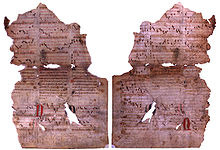
King Dinis was fond of hunting and in 1294 was hunting around Beja, when a bear attacked him and his horse, bringing them to the ground. It is said that he attacked the beast single-handedly and killed him with a dagger. To commemorate the incident, the king had a live bear captured and taken to his palace of Fuellas for the amusement of the gentleman and ladies of his court.
As heir-apparent to the throne, Infante (Prince) Dinis was summoned by his father Afonso III to share governmental responsibilities. The country was again in conflict with the Catholic Church at the time, Afonso having been excommunicated in 1277, and only being absolved in 1279 when he acceded to Rome's demands on his deathbed. Consequently, the church was favorably inclined to reach an agreement with the new monarch upon his accession to the throne.
In 1284, however, Dinis emulated the example of his grandfather and father, and launched a new series of inquiries to investigate the expropriation of royal property; this was to the detriment of the church. The next year he took further steps against ecclesiastical power when he promulgated amortization laws. These prohibited the church and religious orders from buying lands, and required that they sell or forfeit any they had purchased since the start of his reign. Several years later he issued another decree forbidding them to inherit the estates of recruits to the orders.
In 1288, Dinis managed to persuade Pope Nicholas IV to issue a papal Bull that separated the Order of Santiago in Portugal from that in Castile, to which it had been subordinate. With the extinction of the Knights Templar, he was able to transfer their assets in the country to the Order of Christ, specially created for this purpose.
Dinis was essentially an administrator and not a warrior king. He went to war with the kingdom of Castile in 1295, relinquishing the villages of Serpa and Moura. In 1297, he signed the Treaty of Alcañices with Castile, which defined the current borders between the two Iberian countries, and reaffirmed Portugal's possession of the Algarve. The treaty also established an alliance of friendship and mutual defense, leading to a peace of 40 years between the two nations.
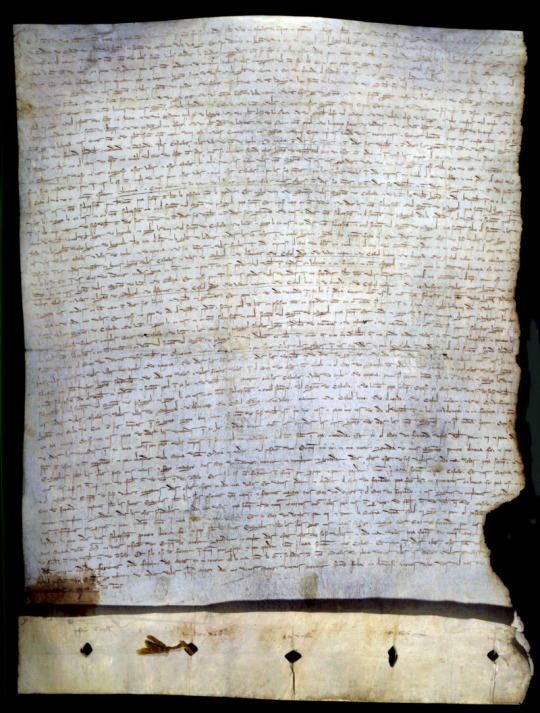
Dinis pursued his father's policies on legislation and centralization of power, and promulgated the nucleus of a Portuguese civil and criminal law code, protecting the lower classes from abuse and extortion. These edicts survived in the Livro das Leis e Posturas (Book of Laws and Postures), and the Ordenações Afonsinas (Afonsine Ordinances), proclaimed during the reign of Afonso V. These are not legislative "codes" as we understand them today, but rather compilations of laws and customary municipal law, as amended and restated by the Portuguese crown.

As king, Dinis traveled around the country to resolve various problems. He ordered the construction of numerous castles, created new towns, and granted the privileges due cities to several others. He declared in 1290 that 'the language of the people' was to become the language of the state, and officially known as Portuguese. Dinis also decreed that Portuguese replace Latin as the language of the law courts in his kingdom. His wife Isabel donated much of the large income generated by her lands and properties to charities, inspiring Dinis to help improve the life of the poor and found several social institutions.
The frequent procedural issues that arose when he issued his decrees increasingly occupied Dinis in his quest to frame the common law as being within the scope of the crown's jurisdiction, and in exercising royal power in the realm. The restrictions he placed on the actions of alvazis (local council officials), judges, as well as proctors and advocates in the courts, show that a merely nominal power of the monarchy over all the inhabitants of the kingdom, as was typical in the Middle Ages, was not compatible with his effort to assert a royal prerogative to scrutinize legal procedures, or moralize on the exercise of justice. The appointment of magistrates clearly marks the start of the process of the crown claiming territorial jurisdiction, thus expanding the royal domain, along with the growing importance of Lisbon as the nation's de facto capital. The preference for Lisbon as a venue of the royal court was accentuated during Dinis's long reign. There was as yet no official capital of the country, but Lisbon's location, as well as its advanced urban, economic and commercial development, made the city the most viable choice for a national center of administration.
Its geographical situation between the ancient divisions of the country, i.e., the north and the south, enhanced Lisbon's status as the most practical center for an emergent united Portuguese nation, the south now receiving as much royal attention as the north and becoming the residence of the monarchy. Their different characters created a realm where the two regions complemented each other. The great manors were closer together in the north, and the vast dominions conquered from the Muslims in the south, as well as the large areas of unclaimed land there, expanded the domain of the crown, and much of the territory of the extreme south came under the control of the military orders.
Denis promoted development of the rural infrastructure, earning the nickname of "the Farmer" (o Lavrador). He redistributed land, founded agricultural schools to improve farming techniques, and took a personal interest in the expansion of exports. He set up regular markets in a number of towns and regulated their activities. One of his principal achievements was to protect agricultural lands from advancing coastal sands by ordering the extension of a pine forest near Leiria. which also provided a source of raw materials for construction of a naval fleet. This forest, known as the Pinhal de Leiria (Leiria Pinewood),

Sadly it was almost in its total destroyed in the forest fires in 15th of October of 2017.

The latter part of Dinis' generally peaceful reign was nevertheless marked by internal conflicts. The contenders were his two sons: Afonso, the legitimate heir, and Afonso Sanches, his bastard son, who quarreled frequently among themselves for royal favour. At the time of Dinis' death in 1325, he had placed Portugal on an equal footing with the other Iberian Kingdoms.
Afonso, born in Lisbon, was the rightful heir to the Portuguese throne. However, he was not Dinis' favourite son, the old king preferring Afonso Sanches, his illegitimate son by Aldonça Rodrigues Talha. The notorious rivalry between the half brothers led to civil war several times. Isabel would serve as intermediary between her husband and Afonso during the civil war of 1322–1324.
The Infante Afonso greatly resented the king, whom he accused of favoring Afonso Sanches. Dinis had little popular support in the war because of the many privileges he had granted to the nobles in the last years of his reign, while the infante had the support of the county's cities; these circumstances were rooted in the longstanding conflict between the upper and lower classes of Portuguese society. Repulsed to the town of Alenquer, which supported the Infante, Dinis was prevented from killing his son through the intervention of the Queen. As legend holds, in 1323, Isabel, mounted on a mule, positioned herself between the opposing armies on the field of the Battle of Alvalade in order to prevent the combat. Peace returned in 1324 when Afonso Sanches was sent into exile and the Infante swore loyalty to the king.
King Dinis died on 7 January 1325 at Santarém, and was buried in the Monastery of Saint Dinis in Odivelas, near Lisbon.


Afonso then became king, whereupon he exiled his rival to Castile, and stripped him of all the lands and fiefdoms bestowed by their father. From Castile, Afonso Sanches orchestrated a series of attempts to usurp the crown. After he failed several times to mount an invasion of Portugal, the brothers signed a peace treaty, arranged by Afonso IV's mother Queen Isabel.
Bearing in mind the many centuries that separate Dinis from the present, an impression of his personality can be gathered from the historical record: he was determined, even obstinate, in his attempts to systematically centralize the government and consolidate royal power. For example, he launched general inquiries (Inquirições gerais) at a remarkably accelerated pace to investigate land ownership and identify cases where abuses were committed.
Dinis revealed early on his ability as an effective strategist in the pursuit of his goals, and as an innovator of proactive legislative policy. With the benefit of hindsight, it is clear that his administrative decisions were not made randomly or without consideration of his ideal of a well-governed nation. The wide range of his policies is indicated by a few examples: the concomitant creation of new towns and trade fairs, the fortification of the country's borders and the increasing dependence of the military orders on the royal power. He was recognized as an intelligent, perceptive ruler with demonstrated success, both by contemporaries and by later historians.
Dinis was not lacking in political skill. Being adroit in negotiation and a student of human nature, he knew how to go about "opposing and appeasing alternately the secular and the ecclesiastical manorial interests. He confiscated the properties of the clergy, but made the concordat [of 1289] with the Portuguese bishops; he restricted the comedoria (victuals) rights of the monasteries, but replaced those rights with a fixed annual sum of money. His actions were sufficiently [statesmanlike, and his political position was strong] enough, for him to secure the confiscation laws and check the erosion of the state patrimony". As administration of the royal properties became more efficient and he became richer, Dinis gained fame for his wealth, even being mentioned in Dante Alighieri's Divine Comedy.
Nevertheless, Dinis is described in contemporary chronicles as a wise and able ruler. Although most of the legislative work of his reign focused on procedural juridical issues, the purpose of much of this new legislation was to avoid excessive delays and court costs and to prevent abuse by attorneys and prosecutors.The personal determination that allowed Dinis to achieve so much in the political realm could sometimes harden into obstinacy and arrogance.
An inescapable figure in the history of the Iberian Peninsula in the 13th and the beginning of the 14th centuries, Dinis was first called "father of his country" (Pai da Pátria) by the historian Duarte Nunes de Leão in 1600.

The historical sources of King Dinis's time, as well as later authors, failed to provide any detailed physical description of the monarch. The information known comes from an accidental opening of his tomb during a restoration in 1938.
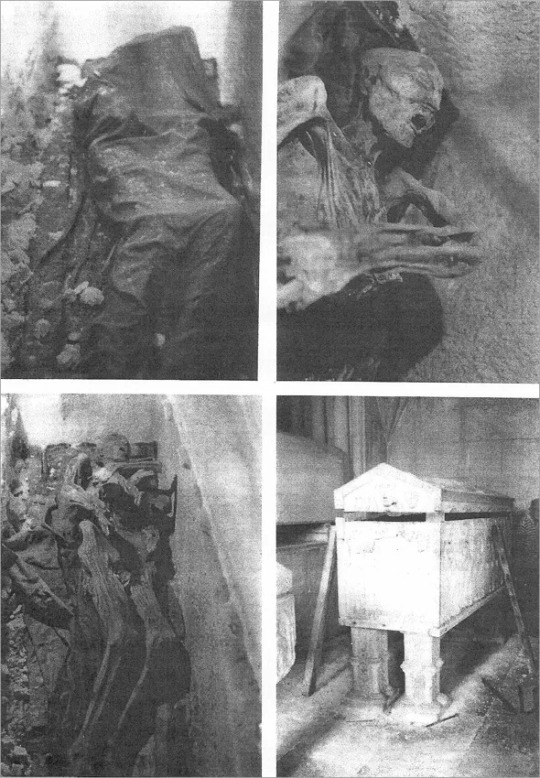
With the lid removed, a red brocade robe was seen covering the body of the King, from head to toe. This mantle was woven with gold threads. In all compliance, it had alternating strips, separated with golden threads and where they had been embroidered for the following reasons: one of the strips were embroidered with pine cones along its entire length; in the next strip they embroidered azores and in the last one they saw fleur of Liz.
With the cloak removed, the King's skeleton was visible, which was complete and covered with parched skin. He wore a very soft white wool vest over his tunic. The head rested on a pillow and was tilted as if sleeping on the left side, a position that the body slightly followed. The right arm is bent over the chest and the left arm is dropped along the body. Only the bones of the feet were separated from each other. In the jaws, the skin was slightly separated and had a long red beard. On the head the skin was not loose from the skull and had tufts of red hair. This is a curious fact, as he was the first of the Portuguese royal line up to that time to have that hair color. This genetic trait could have been passed on the maternal side, as his uncle Fernando, called "La Cerda", or "the bristly one", had red hair as well. Dinis may have inherited the trait from Henry II of England, who was his ancestor on both the paternal and maternal sides, or even possibly from his maternal great grandmother Elisabeth of Hohenstaufen, granddaughter of the Holy Roman Emperor Frederick Barbarossa ("barbarossa" means "red beard" in Italian)
It was discovered that the legend of a figure of towering height was not an accurate one as he was only about 1.65 metres (5 feet 5 inches) tall. Dinis made his last will when he was 61 and died at age 63. He apparently enjoyed excellent health throughout his life, as he traveled frequently, got involved in wars from an early age and at age 60 still hunted. He died with complete dentition, a rarity for the time, something that even today continues to be fairly unusual.
Dinis' only wife was Isabel or Elizabeth of Aragon, daughter of Peter III of Aragon.
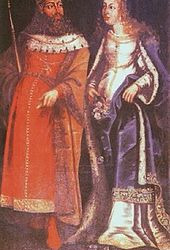
They married in 1288 and she bore him a son and a daughter. Like other monarchs of the time, he had several illegitimate children as well:
Infanta Constança (3 January 1290 - 18 November 1313) Queen of Castile by marriage to Fernando IV of Castile.
Infante Afonso (8 February 1291 - 28 May 1357) Succeeded him as Afonso IV, 7th King of Portugal.
By Maria Pires (?-?)
João Afonso (1280 - 1325) Lord of Lousã
By Marinha Gomes (1260 - ?)
Maria Afonso (1290 - 1340) married Juan Alfonso de la Cerda
Maria Afonso (? - 1320) Nun at the Monastery of Odivelas
By Grácia Froes (1265 - ?)
Pedro Afonso (1287 - 1354) 3rd Count of Barcelos
By Aldonça Rodrigues Talha (1260-?)
Afonso Sanches (1289 - 1329) Lord of Albuquerque and rival of his half-brother Afonso IV
Other natural offspring
Fernão Sanches (1280 - 1329)
8 notes
·
View notes
Text
How ideological differences lead to the Berlin wall
Following WWII, tensions between the USSR and the Western allies (USA, Britain, and France) rose due to the fundamental differences in Communism and Capitalism. This division became known as the Iron Curtain following Winston Churchill’s speech in 1936 in which he said that due to the tensions between the two sides (Capitalist West and Communist East), "iron curtain" has descended across the continent. The Berlin wall became the infamous physical symbol of the deep divide and oppression under the Communist regime in Eastern Europe, but why was it built and why did it fall?
International relations: historical context of Russia and the West
Russia and the West – America and Britain- have had a pretty complicated relationship for a very long time, and this section aims to give the modern historical background of it (1917 up to 1945).
Russia joined WWI in 1914, one of its allies being Britain. The was crippled Russia’s economy: over 17 million farmers were conscripted into the army meaning there were food shortages; factories that didn’t directly contribute to the war effort by making weapons or equipment suffered from under supplying and many had to shut down, leading to further unemployment; and to top it all off the Tsar at the time- Nicholas II -took a personal control of the army despite having no military experience. By 1917, the Russian population was desperate to leave the war, having already lost about 40 million men.
As discontent with the Tsarist regime and continuation in the war grew, support for Lenin and the Bolshevik party also grew. Sure enough, when they came to power in 1917, they issued the Peace Decree which promised an end to the war. After signing the Treaty of Brest- Litovsk in March 1918 (which had deeply detrimental terms for Russia, such as losing 50% of its industry), Russia was out of the war. By abandoning their allies, Russia made the West think communists could not be trusted.
In the years following this, Russia went into civil war. The war was mostly between the Reds (Bolsheviks) and Whites (Mensheviks and other anti-Bolsheviks). The western capitalist countries supported the Whites financially and by sending troops, and although the reason for this wasn’t necessarily because they wanted the Whites to win, but because they didn’t want the Bolsheviks to win, the Reds used the foreign interventions in their anti- white propaganda.
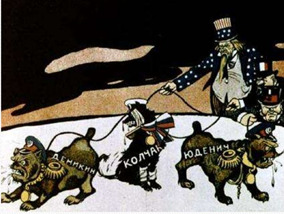
After the Bolsheviks fully established their rule, the western capitalist countries were always seen as enemies that had gone against them in the past and were ready to intervene in national issues if it meant preventing the establishment of communism.
During WWII, USSR, Britain and the United States put aside their ideological differences in order to unite in defeating Nazi Germany. Russia has joined the western allies after in 1941 Hitler broke a non- aggression pact with Stalin by invading the USSR.
Tehran, Yalta and Potsdam
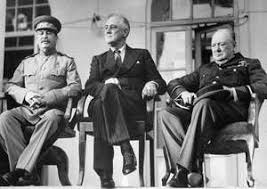
The Big Three, as they became known, met in Tehran, Iran in 1943. Stalin (leader of the USSR), Roosevelt (US president), and Churchill (UK prime minister) had the common aim of improving their relationship with one another and their countries. During that meeting they decided on the opening on the second front- which meant that Britain and America would now open a front at the west of Germany, so Russia doesn’t have to do all the fighting on the Eastern front. This was a turning point in defeating the Germans as it meant their army was now divided.
Although the conference was successful, it did highlight some tensions already: Churchill was very anti-communist and Britain had joined the World War on the 3rd of September 1939 after Poland was invaded by Germany; Stalin wanted complete control over Poland so he can create a ‘buffer zone’ (the countries between the capitalist west and Russia would have to be invaded before Russia would be, giving the Russians more time to react), and was also very distrustful of Britain and the US as he felt their purposely delayed opening the western front. Stalin thought that they had waited so long so Russia would be weakened after fighting Germany for so long, and once the western front was opened, Britain and America could invade Germany and get to Russia next. The reason Stalin was so worried about getting invaded from Germany is because it happened twice already: in 1914 and then again in 1941 when Hitler broke the non-aggression pact he had made with Stalin.
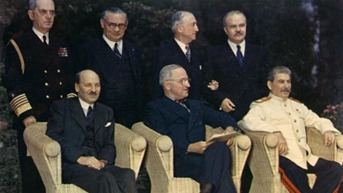
Potsdam conference 1945
The Big Three then had a second meeting- Potsdam February 1945. At this point it was obvious that Germany was going to lose, so the plans surrounded what happens after that point. Among other things, a decision was made that the USSR would have a sphere of influence in Eastern Europe- although exactly what that entails differs depending on which side you asked. The most relevant, in relation to the future of Berlin, decision they made at this conference was to divide Germany in 4 sections following the war. Britain, France, America and Russia would all get one section. Despite being entirely in the Eastern side of Germany, the capital city of Berlin was also divided in this way- with the west 3 sections belonging to the western allies and the east one to the USSR.
Potsdam was the final conference, attended by Stalin, Harry Truman and Clement Atlee. President Roosevelt had died and been replaced by Truman, who was more anti-communist; Churchill had lost the general election and been replaced by Atlee. Despite the shift in leaders, the decision about splitting Germany and Berlin into four was confirmed. After 1933 there had been no free elections in Germany and the Big Three had decided to re-establish them along with democracy, freedom of speech and freedom of press. The Nazi party was banned, and Nazi war criminals were tried. Russia would receive reparations on the form of goods from the Western sectors.
The Berlin Blockade 1948-1949 and establishing of two separate countries
Having been invaded by it twice in the past, Russia wanted to keep Germany to prevent any future threat. The Allies (Britain, France and America) wanted to make it independent and prosperous so they don’t have to keep paying for it, and so they can build trade with Germany. This disagreement was bound to cause conflict.
In 1947, Britain and America joined their sectors to form Bizonia, and due to the very good relations with the French zones, they united with them too forming Trizonia. In Trizonia they decided to introduce a new, trustworthy currency called the Deutsche Mark which was essential if they wanted to rebuild the German economy. This worried Stalin and he retaliated by introducing the Ost Mark in the eastern sectors.
The western sectors of Germany and Berlin were accepting Marshall Aid (American support to help countries rebuild themselves after the war), while the eastern sectors, and eastern Europe apart from Yugoslavia) did not, which deepened the divide between the east and west even more due to their economical states and standards of living.
As Stalin feared western capitalist ideas and currency entering the eastern part of Germany or Berlin, he cut off all rail, road and canal links. This was with the aim that the west would be forced to give up on western Berlin as they wouldn’t be able to get any supplies to their people.
However, Truman saw this was a testing case – he wanted to prove to Stalin that we would not give up and he would maintain his policy of containment (stopping the spread of communism). The allies, the US in particular, started the Berlin airlift to supply western Berliners with necessities. The airlift code-named “operation vittles” had its first flight on the 26th of June 1948 and lasted until 30th September 1949 – even though the blockade was lifted in May of the same year.

The airlift was incredibly successful as both achieving its aim of supplying the citizens- for example on the 16th of April 1949, 1400 flights brought in 13k tons of supplies, even though the necessary amount needed for the western Berliners to over was 6k tons a day- but also at showing the USSR they wouldn’t give up on their citizens. Truman wanted western Berlin to be a symbol of freedom behind the iron curtain.
Straight after the Berlin blockade was lifted, the western sectors officially united as one country – The Federal Republic of Germany. In October of 1949, the eastern part of Germany became the German Democratic Republic (ironically enough).
The wall goes up
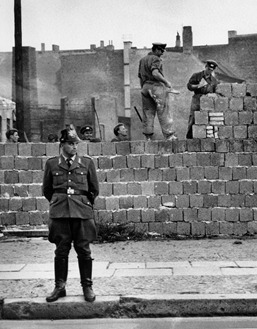
East and West Berlin had been very different. The west was extremely prosperous thanks to the allies investing in it, whereas the East was poor and had low living standards. This resulted in immigration from the East to the West- with over 3.5 million East Germans emigrating to West Germany before 1961, which comprised most of the total net emigration of 4.0 million emigrants from all of Central and Eastern Europe between 1950 and 1959.
On 13th of August 1961, the communist government of the German Democratic Republic started putting up barbed wire fences along the border of West and East Berlin. It was quickly replaced by a concrete one and through the years,more and more was added to it such as watch towers. The 27-mile portion of the barrier separating Berlin into east and west consisted of two concrete walls between which was a “death strip” up to 160 yards wide that contained hundreds of watchtowers, miles of anti-vehicle trenches, guard dog runs, floodlights and trip-wire machine guns.
Hundreds of people tried to go into West Berlin and hundreds died trying to do so. Amongs the people who escaped successfully are the three Bethke brothers, whose escapes are like from an action movie. The oldest of the three, Ingo, escaped by floating on an inflatable mattress across the Elbe River in 1975. Then in 1983, the middle brother, Holger soared over the wall on a steel cable he fired with a bow and arrow to a rooftop in West Berlin. Six years later, they both flew an ultra-light plane over the wall and back to pick up their youngest brother Egbert.
The American view of the wall is nicely summarized by my President Kennedy in 1961: “It’s not a very nice solution, but a wall is a hell of a lot better than a war. This is the end of the Berlin crisis. The other side panicked—not we. We’re going to do nothing now because there is no alternative except war”. The wall was used to show how bad communism is- they had to build a wall to keep people from leaving, which gave it a similar image to a prison. It became a symbol of the division in Berlin, and in Europe at the time.
Accidental freedom
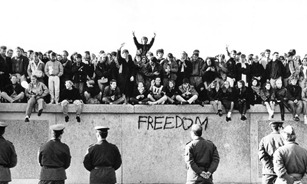
Although it came after years of discontent and protests, the fall of the Berlin wall was accidental. East Germany had decided that its citizens can emigrate for a short period of time, after having gone through a lengthy visa process.

Then on the 9th of November 1989, a press conference took place at which East German politburo member Günter Schabowski prematurely announced that restrictions on travel visas would be lifted. People attending started questioning him and when asked when this new policy would take power he responded with: “Immediately, without delay.”
His confused answers and the erroneous media reports that followed, sent a wave of people to the Berlin wall ready to cross it.
The chief officer on duty at Bornholmer Street checkpoint, overwhelmed by the thousands of people and by the insults rather than instructions he received from his superiors, opened the border crossing and the gates soon followed. The flood of East Berliners couldn’t be stopped by the officials.
The symbolism of the fall

For decades the wall symbolized the division ideologies can make. Because of the differences between capitalist and communist way of rule, and the difference in priorities and values they had, the people of Berlin were entirely separated. Eastern Berliners grew up being restricted and isolated while the West being prosperous and having opportunities. The fall of the wall symbolized the fall of the division, or at least to a point in which people weren’t physically restricted, or risked losing their life if they tried to escape.
#cold war#ussr#berlin wall#kennedy#berlin#east berlin#west berlin#bizonia#trizonia#history#historyblr#9th november 1989#communism#capitaliam#capitalism#ideological difference#history article#essay
2 notes
·
View notes
Text
Events 1.27
98 – Trajan succeeds his adoptive father Nerva as Roman emperor; under his rule the Roman Empire will reach its maximum extent. 945 – The co-emperors Stephen and Constantine are overthrown and forced to become monks by Constantine VII, who becomes sole emperor of the Byzantine Empire. 1186 – Henry VI, the son and heir of the Holy Roman Emperor Frederick I, marries Constance of Sicily. 1302 – Dante Alighieri is condemned in absentia and exiled from Florence. 1343 – Pope Clement VI issues the papal bull Unigenitus to justify the power of the pope and the use of indulgences. Nearly 200 years later, Martin Luther would protest this. 1606 – Gunpowder Plot: The trial of Guy Fawkes and other conspirators begins, ending with their execution on January 31. 1695 – Mustafa II becomes the Ottoman sultan and Caliph of Islam in Istanbul on the death of Ahmed II. Mustafa rules until his abdication in 1703. 1759 – Spanish forces clash with indigenous Huilliches of southern Chile in the battle of Río Bueno. 1776 – American Revolutionary War: Henry Knox's "noble train of artillery" arrives in Cambridge, Massachusetts. 1785 – The University of Georgia is founded, the first public university in the United States. 1820 – A Russian expedition led by Fabian Gottlieb von Bellingshausen and Mikhail Petrovich Lazarev discovers the Antarctic continent, approaching the Antarctic coast. 1825 – The U.S. Congress approves Indian Territory (in what is present-day Oklahoma), clearing the way for forced relocation of the Eastern Indians on the "Trail of Tears". 1868 – Boshin War: The Battle of Toba–Fushimi begins, between forces of the Tokugawa shogunate and pro-Imperial factions; it will end in defeat for the shogunate, and is a pivotal point in the Meiji Restoration. 1869 – Boshin War: Tokugawa rebels establish the Ezo Republic in Hokkaidō. 1874 – Modest Mussorgsky's opera Boris Godunov premieres in Mariinsky Theatre in St.Petersburg 1880 – Thomas Edison receives a patent for his incandescent lamp. 1916 – World War I: The British government passes the Military Service Act that introduces conscription in the United Kingdom. 1918 – Beginning of the Finnish Civil War. 1924 – Six days after his death Lenin's body is carried into a specially erected mausoleum. 1927 – Ibn Saud takes the title of King of Nejd. 1939 – First flight of the Lockheed P-38 Lightning. 1943 – World War II: The Eighth Air Force sorties ninety-one B-17s and B-24s to attack the U-boat construction yards at Wilhelmshaven, Germany. This was the first American bombing attack on Germany. 1944 – World War II: The 900-day Siege of Leningrad is lifted. 1945 – World War II: The Soviet 322nd Rifle Division liberates the remaining inmates of Auschwitz-Birkenau. 1951 – Nuclear testing at the Nevada Test Site begins with Operation Ranger. 1961 – The Soviet submarine S-80 sinks when its snorkel malfunctions, flooding the boat. 1965 – South Vietnamese Prime Minister Trần Văn Hương is removed by the military junta of Nguyễn Khánh. 1967 – Apollo program: Astronauts Gus Grissom, Ed White and Roger Chaffee are killed in a fire during a test of their Apollo 1 spacecraft at the Kennedy Space Center, Florida. 1967 – Cold War: The Soviet Union, the United States, and the United Kingdom sign the Outer Space Treaty in Washington, D.C., banning deployment of nuclear weapons in space, and limiting the usage of the Moon and other celestial bodies to peaceful purposes. 1973 – The Paris Peace Accords officially ends the Vietnam War. Colonel William Nolde is killed in action becoming the conflict's last recorded American combat casualty. 1980 – Through cooperation between the U.S. and Canadian governments, six American diplomats secretly escape hostilities in Iran in the culmination of the Canadian Caper. 1983 – The pilot shaft of the Seikan Tunnel, the world's longest sub-aqueous tunnel (53.85 km) between the Japanese islands of Honshū and Hokkaidō, breaks through. 1996 – In a military coup, Colonel Ibrahim Baré Maïnassara deposes the first democratically elected president of Niger, Mahamane Ousmane. 1996 – Germany first observes the International Holocaust Remembrance Day. 2002 – An explosion at a military storage facility in Lagos, Nigeria, kills at least 1,100 people and displaces over 20,000 others. 2003 – The first selections for the National Recording Registry are announced by the Library of Congress. 2010 – The 2009 Honduran constitutional crisis ends when Porfirio Lobo Sosa becomes the new President of Honduras. 2010 – Apple announces the iPad. 2011 – Arab Spring: The Yemeni Revolution begins as over 16,000 protestors demonstrate in Sana'a. 2011 – Within Ursa Minor, H1504+65, a white dwarf with the hottest known surface temperature in the universe at 200,000 K, was documented. 2013 – Two hundred and forty-two people die in a nightclub fire in the Brazilian city of Santa Maria, Rio Grande do Sul. 2014 – Rojava conflict: The Kobanî Canton declares its autonomy from the Syrian Arab Republic. 2017 – A naming ceremony for the chemical element tennessine takes place in the United States.
0 notes
Text
ARMORED CAR
“They will manhandle and persecute you.” —Luke 21:12
Jesus tells us we will be delivered up even by our parents, brothers, relatives, and friends (Lk 21:16). This will result in some of us being put to death. Jesus has made it very clear that, before there can be peace, there will be division in families. “A household of five will be divided three against two and two against three; father will be split against son and son against father, mother against daughter and daughter against mother, mother-in-law against daughter-in-law, daughter-in-law against mother-in-law” (Lk 12:52-53).
Our families will be under extreme pressure in the future and severely tried. Jesus reveals the future not to discourage us but to encourage us to plan accordingly in the present. For example, if we were building a car and we knew this car would be driven through a crossfire of bullets, we would build an armored car. So, if we’re building a family and we know this family will be attacked by the devil, then we will build an “armored family.” “Put on the armor of God so that you may be able to stand firm against the tactics of the devil” (Eph 6:11). “You must put on the armor of God if you are to resist on the evil day” (Eph 6:13). On Thanksgiving Day, many of us will be gathering with our families. We can engage in superficialities, keep quiet about Jesus, and pray by ourselves. Or we can ask the Spirit to work through us in building strong, deeply committed, holy families. Would you talk to your family differently if you knew they might betray you?
Prayer: Father, send the Spirit to give me a realistic view of my family’s future. May I build my family for the future spiritual warfare.
Promise: “I then saw something like a sea of glass mingled with fire. On the sea of glass were standing those who had won the victory over the beast.” —Rv 15:2
Praise: Pope St. Clement I was a disciple of the apostles. His writings stress the importance of Church authority and unity.
0 notes
Text
Module 12

Athletes play a large role in society, as a public entity and an inspiration to many. Although not historically, sports can offer a place for people of color to rise up and gain public recognition for their talents and hard work. There are many Latinx athletes who have taken great strides and had major impacts.

One such athlete was Roberto Clemente, who was a Puerto Rican baseball player. Many think of Roberto Clemente in a similar fashion to Jackie Robinson due to his role in professional baseball during a time of great racial tension and division in the United States. Although I do not have much personal interest in sports, I have a lot of respect for the Latinx athletes, of all ethnicities and backgrounds, given how they put their all into their passion in spite of oppression and inequality.
Spiritual mestizaje is the reframing and renewal of one's relationship to sacred figures and ideals. This can take place through reflection upon oppression and inequality in one's life, as well as dedicating more to honoring the sacred. Spiritual mestizaje can be applied to Chicanx and Latinx studies, feminist studies, and border studies. Additionally, the idea of spiritual mestizaje can be seen not only among Latinx and Chicanx and Indigenous peoples, but also through the works of other people of color, including Toni Morrison and Louise Erdrich. A common saying in relation to spiritual mestizaje is that "life honors the sacred," and engaging with spirituality and saints can offer a way of engaging and living in our society. My great grandmother was very fond of the saints, particularly the Virgen de Guadalupe. In addition to having paintings and altars for the Virgen around the house, my grandma prayed to her with wishes and hopes and disappointments.

Depending on a community's religious standing and beliefs, saints may play a large role in Chicanx and Latinx spiritual practices as they offer guidance, support, love, and hope to many. Santa Muerte is a saint of death, with the most common prayer or petition being:
"Beloved Death of my heart, do not abandon me, protect me, and do not allow [name] a single moment of peace, bother him constantly, torment him, worry him, worry him, so that he will think of me always. Amen."
Imploring Santa Muerte typically means asking Santa Muerte for some of her power so one may have more control over her former lover. The relationship to Santa Muerte is much more equal than that of other saints, and it represents an exchange or a give and take, offering a chance to have a two-way relationship, as one seeks in their relationships with others.
0 notes
Photo

11th May >> (@zenitenglish) Pope Francis to Orthodox Metropolitan: ‘Let’s Never Be Discouraged in Journey Toward Unity’ Primate of the Orthodox Church of the Czech Lands and Slovakia Orthodox Metropolitan Rastislav Visits Pope for the first time. (Deborah Castellano Lubov @zenitenglish) His Beatitude the Metropolitan Rastislav, Archbishop of Prešov, Primate of the Orthodox Church of the Czech Lands and Slovakia, visited Pope Francis today May 11, 2018. This marks the first visit to Pope Francis by the Metropolitan, elected in January 2014. During his stay in Rome, May 9- 12, the Metropolitan will meet His Eminence Cardinal Kurt Koch in the offices of the Pontifical Council for Promoting Christian Unity. The Metropolitan will celebrate the Divine Liturgy at the tomb of Saint Cyril in the Basilica of Saint Clement. The Orthodox Church of the Czech Lands and Slovakia is one of the fourteen autocephalous Orthodox Churches of Byzantine tradition, and has its origin in the evangelization of Great Moravia by Saints Cyril and Methodius. In his address to the Metropolitan, the Holy Father expressed his joy to welcome him and his delegation, and appreciation “for the spiritual bonds that unite us and encourage us to continue in mutual edification and in the common search for peace, a gift of the Risen One.” The Pope expressed his view that the visit, is “a gift to grow in mutual edification, strengthening our spiritual bonds and friendship.” Illustrating such bonds, the Pope said, is the presence here in Rome, in the ancient Basilica of San Clemente, of the tomb of Saint Cyril, Apostle of the Slavs, whose preaching has spread the faith in the lands where your Church carries out its mission. The Pontiff recalled that the Metropolitan celebrated the Divine Liturgy at his tomb, paying homage to this illustrious saint, revered by the Christians of the East and the West. The persecuted are an urgent appeal The figure of St. Cyril, Pope Francis said, inspired him to share fraternally with the Metropolitan and delegation three brief thoughts. According to tradition, it was the brothers Cyril and Methodius, coming from Salonika, to bring to Pope Hadrian II the relics of St. Clement, one of the first Bishops of Rome, who died in exile under the emperor Trajan. The gesture of Cyril and Methodius reminds us that we Christians have inherited – and we continually need to share – an immense common patrimony of holiness. “Among the many witnesses, countless martyrs have professed fidelity to Jesus in past centuries, such as San Clemente, but also in recent times, for example when atheistic persecution has affected your countries. Even today the sufferings of many brothers and sisters persecuted because of the Gospel are an urgent appeal, which challenges us to seek greater unity. May the example of Cyril and Methodius help us to enhance this patrimony of holiness that already unites us!” To proclaim the Lord is not enough A second aspect, which reminds us of the Holy Apostles of the Slavs, the Pope added, concerns the relationship between evangelization and culture. “Byzantine culture, the holy brothers had the audacity to translate the Gospel message into a language accessible to the Slavic peoples of Greater Moravia. By incarnating the Gospel in a given culture, they gave development to the culture itself. The apostolate of Saints Cyril and Methodius, which Pope John Paul II proclaimed as co-patrons of Europe, remains for all of us today a model of evangelization. “To proclaim the Lord is not enough to reaffirm the patterns of the past, but we must listen to the Spirit, who always inspires new and courageous ways to evangelize our contemporaries. The Spirit does so today, even in traditionally Christian countries often marked by secularization and indifference.” Reconciliation in diversity The Pope’s last thought came from Saints Cyril and Methodius, who he noted, succeeded in overcoming divisions between Christian communities of different cultures and traditions. In this sense, he said, we can say that they were “authentic precursors of ecumenism.” (John Paul II, Letter Slavorum Apostoli, 14). “They remind us so that unity does not mean uniformity, but reconciliation of diversity in the Holy Spirit.” Pope Francis concluded, praying: “May the witness of Saints Cyril and Methodius accompany us on the journey towards full unity, encouraging us to live this diversity in communion and to never be discouraged in our journey, which we are called to do by the Lord’s will and with joy.” “I ask the Lord, through the intercession of Saints Cyril and Methodius, that we may one day reach full unity, towards which we walk. I beg you to offer your faithful the assurance of my prayerful remembrance and my cordial greeting in the risen Christ. Invoking upon all the blessing of the Lord and the protection of the Mother of God, I ask you to reserve me a place in your prayers.” 11Th MAY 2018 14:20ECUMENISM AND INTERRELIGIOUS DIALOGUE
1 note
·
View note